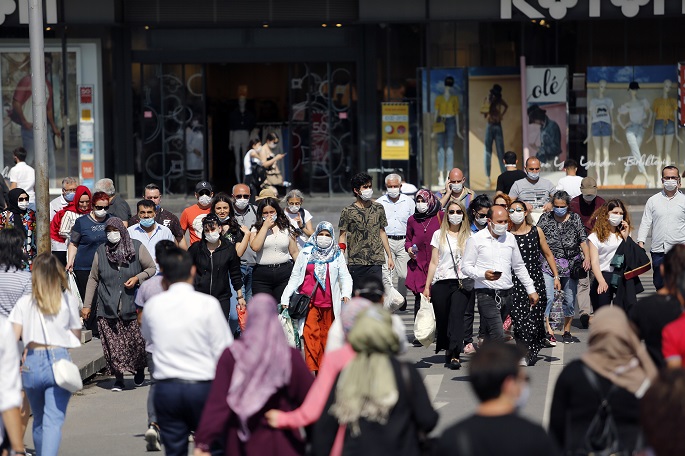Turkey considers restrictions for Eid al-Adha holiday
Published : 17 Jul 2020, 22:37
Updated : 17 Jul 2020, 22:57
Turkey's number of new daily COVID-19 cases has dropped this week under the critical 1,000 threshold, but authorities have not ruled out new restrictions during the upcoming Muslim holiday as millions will roam across the country, reported Xinhua.
The Health Ministry announced Thursday 933 new infections, bringing the total confirmed cases to 216,873.
Turkey has lifted on June 1 most of the coronavirus restrictions imposed in mid-March and daily cases have risen since then hovering between 1,400-1,500 each day.
Government officials and doctors are now worried that the Eid al-Adha holiday, which is expected to end in the early days of August according to the Islamic lunar calendar, could reverse the gains.
During the holiday, millions of people migh travel across cities to visit their families and sacrifice an animal, or go on a family vacation, which may seriously increase the risks of contagion within the country.
As most foreign tourists avoided to visit Turkish resorts this summer because of the pandemic and travel restrictions, travel agencies and hotels are offering bargains to lure domestic tourists.
"The holiday should not be a pretext of increased new cases. The outbreak is far from over, we must be very vigilant and avoid to do things that may increase the infections," Gule Cinar, a specialist in infectious diseases from an Ankara public hospital, told Xinhua.
The doctor explained that after restrictions were lifted last month, two COVID-19 wards, which had been closed during the lockdown as new infections dropped, had been reopened to treat new patients.
"The medical workers are doing the best they can to treat patients," she said, urging citizens to limit their mobility.
Health Minister Fahrettin Koca has ruled out curfews, but said that there might be restrictions on a regional level based on numbers recorded in different provinces.
"A curfew is not on the agenda, but certain measures are being considered," he said this week, implying that in COVID-19 hotspots such as Istanbul, Turkey's biggest city, which accounts for over 50 percent of all cases, restrictive measures may be imposed.
The minister said that weddings, funerals and military conscripts send-off parties were the main reason for the recent rise of new infections. Some local authorities have introduced new restrictions to those events.
Additional measures have also been imposed on marketplaces of sacrificial animals, which will be frequented by tens of thousands of customers during the feast.
Tevfik Ozlu, a professor of thoracic diseases and member of the Coronavirus Science Board, warned that citizens should not go back to their normal lifestyle yet as there are still around 20 deaths every day due to the virus.
"We don't have the luxury to live a normal life anymore until an effective vaccine is found, we have to abide by health measures," he said.
Authorities warned that failure to comply with rules will lead to high COVID-19 figures, adding that another challenge awaits Turkey after the holiday as schools are likely to reopen at the end of August.

